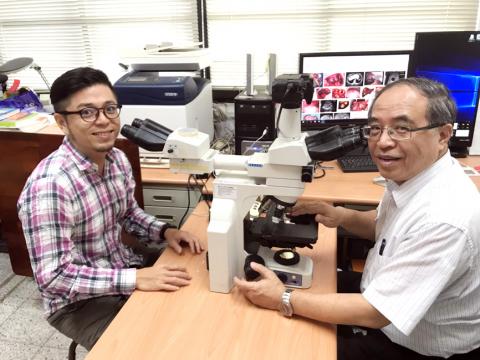National Taiwan University (NTU) veterinary medicine professor Liu Chen-hsuan (劉振軒) and his student Huang Wei-hsiang (黃威翔) have over the past few years helped lay a foundation for veterinary forensic science in Taiwan, where the field has not yet developed as a profession.
“Veterinary forensic medicine uses veterinary medicine to solve legal problems,” Liu said. “The most important task is the necropsy. The body is like a book — it is a record of the cause of death and the truth. Veterinary forensics reads between the lines to search for traces of crime and recover the truth.”
Liu previously served as chairman of the university’s School of Veterinary Medicine and superintendent of the NTU Veterinary Hospital.

Photo: Huang Chieh, Taipei Times
When he was young, he was interested in the way forensic doctors could obtain evidence and determine the cause of death from a body that could not communicate itself, Liu said.
Last year, a large number of stray dogs died in quick succession, he said.
“There were local rumors that someone was poisoning dogs,” Liu said. “But necropsy reports confirmed that the stray dogs had all been infected by a canine distemper virus because they had not been vaccinated.”
A cat owner and animal lover, Huang said he has always enjoyed mystery novels and digging for the truth.
When Huang entered the master’s program in 2011, he said that Liu told him: “Let us develop veterinary forensic medicine.”
Huang has presented his research at the annual Veterinary Forensic Sciences Conference hosted by the International Veterinary Forensic Sciences Association in Florida for four consecutive years, making Taiwan the first Asian nation to participate in the conference.
“The field of veterinary forensic medicine first originated because animal traces appeared at crime scenes and the investigators required the expertise of veterinarians,” Huang said.
Mysterious deaths of wild animals, illegal hunting, the smuggling of animal products and a rise in awareness about animal protection, as well as cases of animal torture have all led to an increased demand for the profession, Huang added.
Liu and Huang said that with the support of others, such as the Taipei Animal Protection Office, they have been able to gradually establish the field of veterinary forensic science at NTU.
They said they have built experience through requests from criminal cases and given speeches all across the country, planting seeds for veterinary forensic medicine to develop in different regions.
Due to their efforts, the Kaohsiung Animal Protection Office established a veterinary forensic medicine team early this year, they said.
Liu’s team consists only of himself, Huang and two master’s students.
Due to the shortage of hands, the team is only accepting requests from local animal protection offices at the moment, they said.
This story has been updated since it was first published.

CAUTION: Based on intelligence from the nation’s security agencies, MOFA has cautioned Taiwanese travelers about heightened safety risks in China-friendly countries The Ministry of Foreign Affairs (MOFA) yesterday urged Taiwanese to be aware of their safety when traveling abroad, especially in countries that are friendly to China. China in June last year issued 22 guidelines that allow its courts to try in absentia and sentence to death so-called “diehard” Taiwanese independence activists, even though Chinese courts have no jurisdiction in Taiwan. Late last month, a senior Chinese official gave closed-door instructions to state security units to implement the guidelines in countries friendly to China, a government memo and a senior Taiwan security official said, based on information gathered by Taiwan’s intelligence agency. The

The National Immigration Agency (NIA) said yesterday that it will revoke the dependent-based residence permit of a Chinese social media influencer who reportedly “openly advocated for [China’s] unification through military force” with Taiwan. The Chinese national, identified by her surname Liu (劉), will have her residence permit revoked in accordance with Article 14 of the “Measures for the permission of family- based residence, long-term residence and settlement of people from the Mainland Area in the Taiwan Area,” the NIA said in a news release. The agency explained it received reports that Liu made “unifying Taiwan through military force” statements on her online

Taiwan Semiconductor Manufacturing Co (TSMC), the world’s largest contract chipmaker, said yesterday that it is looking to hire 8,000 people this year, at a time when the tech giant is expanding production capacity to maintain its lead over competitors. To attract talent, TSMC would launch a large-scale recruitment campaign on campuses across Taiwan, where a newly recruited engineer with a master’s degree could expect to receive an average salary of NT$2.2 million (US$60,912), which is much higher than the 2023 national average of NT$709,000 for those in the same category, according to government statistics. TSMC, which accounted for more than 60 percent

A magnitude 5.7 earthquake struck off Taitung County at 1:09pm today, the Central Weather Administration (CWA) said. The hypocenter was 53km northeast of Taitung County Hall at a depth of 12.5km, CWA data showed. The intensity of the quake, which gauges the actual effect of a seismic event, measured 4 in Taitung County and Hualien County on Taiwan's seven-tier intensity scale, the data showed. The quake had an intensity of 3 in Nantou County, Chiayi County, Yunlin County, Kaohsiung and Tainan, the data showed. There were no immediate reports of damage following the quake.